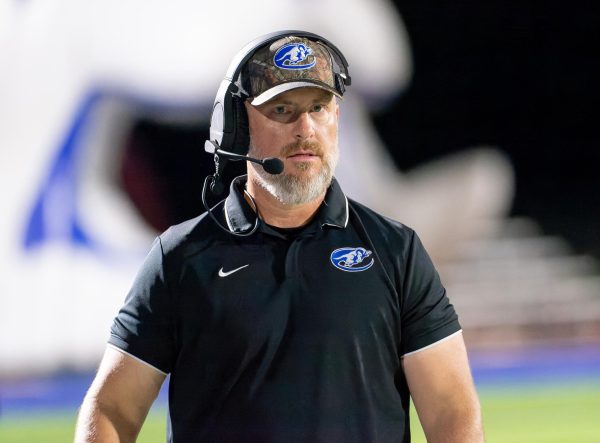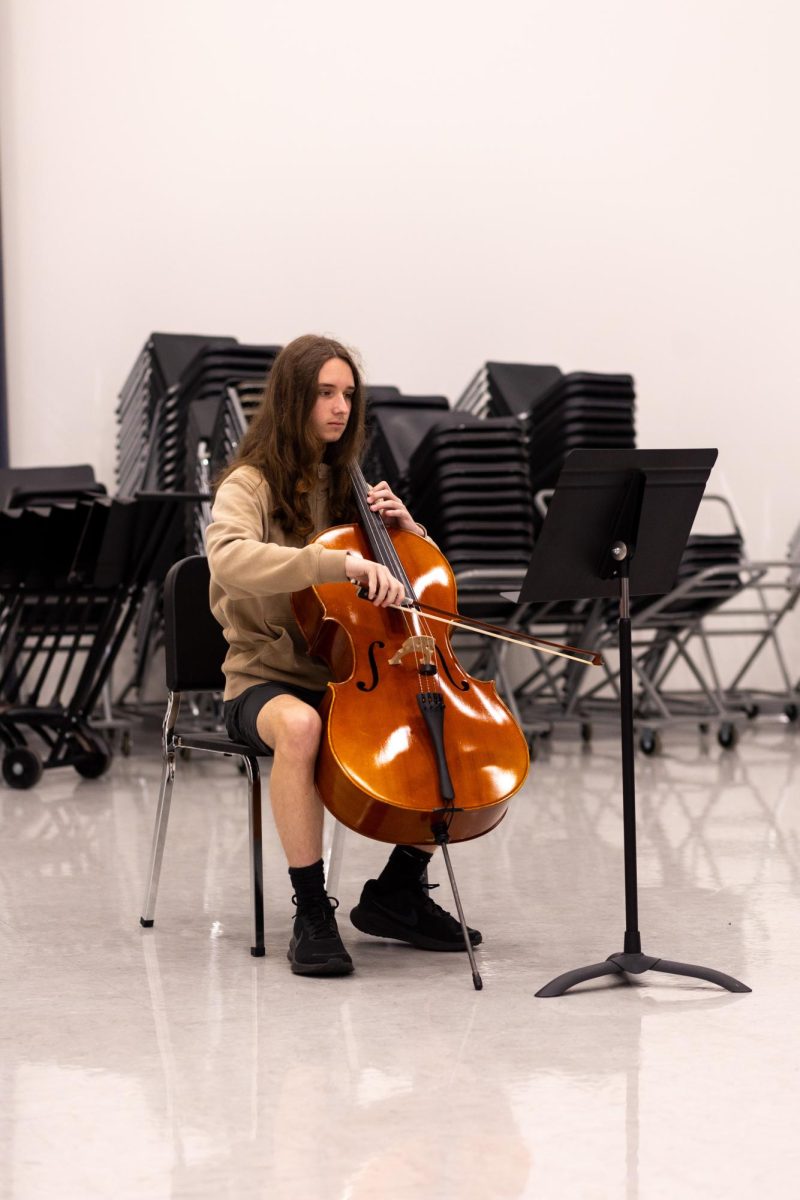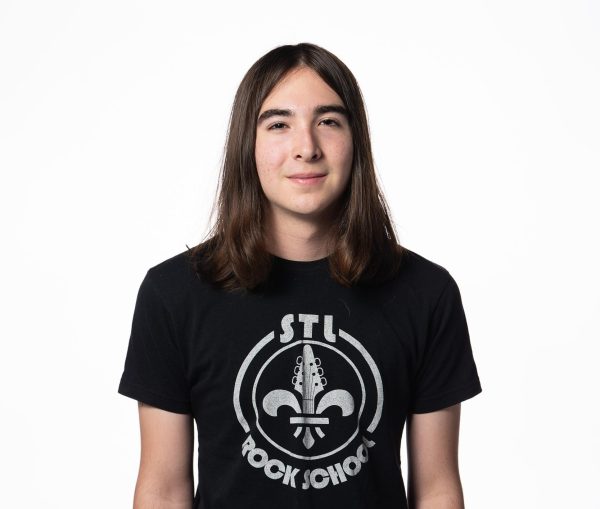High School Musical” is a cult classic that captures the beautiful story of a man burdened with a choice. He has to choose between sports and theater, ultimately deciding both can exist in the same person. This story demonstrates how one person can enjoy what are sometimes considered conflicting hobbies. The concluding lesson leads us all to examine what society has deemed as ‘right.’ Enter science teacher Adam Hamilton: a man who took the lesson of “High School Musical” to heart and is now living a life that would make Troy Bolton proud. By finding a way to balance his teaching and coaching, Hamtilon tries to be a positive influence to his students and players. Hamilton started teaching at Ladue High School two years ago. With him, he brought his previous experience as a teacher, a lawyer, a football coach and a man raised in a vastly different school environment.
“It was, ‘Sit down, be quiet, do the work,’” Hamilton said. “You were told you were smart when you got great grades. There was very little thought to the type of school work I did growing up.”
Despite the different learning environment Hamilton grew up in, he considers his family to be a major influence to his current teaching style. Hamilton’s mother managed the business end of a school, meaning he was able to see firsthand her relationship and connection with the students.
“The kids all knew her,” Hamilton said. “She built relationships with them, and kids could come to her when they had a problem. That influenced me to see that being an educator was more about connecting with kids than it was about knowing the subject best.”
Hamilton’s experience with school flipped once he attended University of Missouri School of Law. This change in environment largely contributed to the way he views both learning and teaching today.
“I didn’t learn how to think, especially think on my feet, until I got thrown into law school,” Hamilton said. “They take 150 human beings who are all incredibly intelligent [and] highly motivated, and you’re competing against one another for jobs, internships [and] clerkships. You’re directly ranked against one another; it’s a high-stress environment.”
Hamilton’s experiences while at law school didn’t just teach him a different way to learn, it also taught him a different way to teach. The quick pace and on-your-feet style of learning in law school classes are reflected in Hamilton’s teaching style while in his classroom.
“We come in with a plan,” Hamilton said. “But kid number one may have had a bad day. Kid number two may be having a great day. How do I adapt my plan to get the most out of those kids? That was really a lot of the trial work that I had, learning how to think on my feet, learning how to process information in real time and come up with answers.”
Just as Hamilton gained influence from his time as a lawyer, he looks to his time as a football coach as another place to draw inspiration for his personal attitude when it comes to teaching and supporting his students.
“I coach and teach kids before I teach science; meaning my job is to [use] science as a tool to help you become the best version of yourself,” Hamilton said. “I want to teach you that science is a great process to learn how to solve complex problems that have uncertain answers. [Such as] what house to buy, what car to buy, what college to go to. The process of science will help you make the best possible decision in those things.”
Hamilton’s father was a baseball coach when he was a kid. Growing up around his father’s coaching style helped him develop into the coach and teacher he is today.
“[My father] coached all my baseball teams,” Hamilton said. “We would never get the best athletes on our teams, but my dad would just grind like crazy to figure out how to make them better. We were never the most talented, but we always made the most growth. Seeing my dad say, ‘I don’t care where you are, I’m going to help you get to where you want to go,’ [that] really influenced what I want to be as a teacher.”
Hamilton’s passion for coaching doesn’t stop at high school sports. He recently began coaching for St. Louis Slam, an adult
women’s football league.
“I was asked to help coach and it’s been an awesome experience,” Hamilton said. “For the first time in my life I’m coaching adults. It’s the first time in my life I’m coaching women, and I have just fallen head-over-heels in love with trying to help these amazing athletes become the best versions of themselves.”
Hamilton brings the same holistic mentality when it comes to coaching adults. His passion behind teaching is similarly seen in his time with this league.

“We won our first ever national championship this summer,” Hamilton said. “As we’re walking off the field, a group of high school boys stopped my female athletes and were asking them for [their] autographs. That’s such a big deal to watch these amazing athletes get recognized for their dedication, their sacrifice, their hard work, the mental and physical beating that this particular sport puts on you, and to see them rise to the pinnacle of being thebest at what they do.”
Hamilton’s passion for teaching and coaching leads him to try and make strong connections with all of his students.
“I try to get to know my students in terms of what motivates them, what are their interests and take a genuine interest in those things,” Hamilton said. “I’m a learner. I love to learn things. So, if it’s something we have in common, great. That’s a way that we can have a connection. So when I do need to push [my students] or things are getting tough, [they] know that I’ve made a connection and [I] care about [them] beyond just [their] grade.”
Hamilton’s passion for teaching stems from his love for his students. Behind every decision he makes in his classroom, his students’ best interests are at the forefront.
“I’m one of those crazy individuals who wakes up every day and I’m like, ‘Dude, I get to do this job,’” Hamilton said. “I want to try to be the person I needed when I was that age, because nobody understood me when I was that age. The idea of being a football player who did theater, I didn’t fit in either group. I like trying to find the kids that need help and figure out how [we can] help them.”
Hamilton doesn’t only have a positive influence on his students, but his coworkers as well. Science teacher Ben Nims works beside Hamilton in the science department.
“When you first meet him, he’s very friendly,” Nims said. “You can tell he’s very genuine, and he’s a very easy person to connect with right away. He shakes your hand, he looks you in the eye and he’s just easy to talk to.”
Hamilton sees his job as more than just an opportunity
to teach science. He tries to help each student that enters his class, especially when it comes to their mental health.
“When I was growing up we didn’t talk about mental health,” Hamilton said. “My family has a very deep history of mental struggles, and one of the things I’ve learned real quick about being in this profession is young men need to hear from grown men. It’s okay to not be okay. It’s not okay to not tell someone.”
Having been brought up in an environment that tended to underplay mental health, Hamilton has made it his goal to insure his
students never feel that their mental health is ignored.
“My mother suffered from anxiety very badly and [she] was of a generation that didn’t get help,” Hamilton said. “I saw it affect her personality. I’ve been very outspoken about my own journey with anxiety. I have no problem admitting that when I need to, I go see a therapist, because it’s my mental health coach. I tell people all the time, if I wanted to teach somebody how to throw a curveball, I can’t do it, because I’m not a baseball coach. I’m gonna go find a baseball coach to teach them. So why do we not
want to receive mental health coaching?”





![School resource officer Rick Ramirez sits in his office. He usually spends little time in his office throughout his day of work, focusing on other issues. “Where our students are, I try to be,” Ramirez said. “Sometimes I get off at 2:45 p.m. when nothing’s going on, or sometimes I get off at 10 p.m. [Those are] my hours.”](https://laduepublications.com/wp-content/uploads/2024/12/Hsiao_20241203_ID_RickRamirez_007-799x1200.jpg)

![Reva poses in front of her home and address plaque. After reuniting with her father and grandparents, she has made many new memories and retained her culture. “We have a lot of Indian cooking going on,” Reva said. “I also like telling people about Indian food, mainly because that’s something that really connects me to [Mumbai].”](https://laduepublications.com/wp-content/uploads/2024/12/At-Home-1200x799.jpg)


